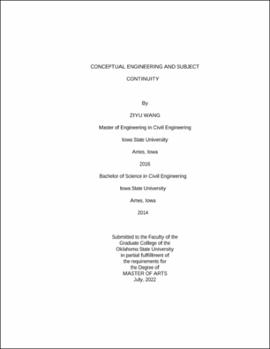| dc.contributor.advisor | Recker, Doren | |
| dc.contributor.author | Wang, Ziyu | |
| dc.date.accessioned | 2023-04-12T19:38:45Z | |
| dc.date.available | 2023-04-12T19:38:45Z | |
| dc.date.issued | 2022-07 | |
| dc.identifier.uri | https://hdl.handle.net/11244/337392 | |
| dc.description.abstract | Conceptual engineering, generally conceived, is the practice of changing the meaning of a term with respect to some identifiable purposes that can explain why certain changes are necessary. Conceptual engineering is often also called revisionary analysis. The idea is the same, we engineer and revise the old meaning so the purposes that merit the change can be fulfilled. But this practice has drawn criticism for changing the subject. Strawson (1963)’s accusation is particularly prominent. He thinks that if we change the meaning of a term, we necessarily change the set of entities (or extension) it picks out, and as a result, the subject. However, his subject-change view of revisionary analysis cannot make sense of the cases where genuine meaning replacement happens without changing the subject: for instance, ‘whales’ used to mean ‘a kind of fish’ but now it means ‘a kind of mammal’; the meaning change is significant, but the subject remains stable. To accommodate those cases, I think a different subject-change view can be formulated that argues not if revisionary analyses necessarily change the subject, but that they are likely to. I find many accounts of subject continuity fall short of refuting the reformed version. Since I think subject change is a fair criticism for revisionary analysis, I will argue a case that directly repudiate it. I think there are three markers that revisionary analyses have that make it likely that they are on topic: (1) metalinguistic disagreements between the old and new usage can be settled based on some dimension of evaluations; (2) revisionary analysists are on good epistemic ground by proposing the meaning change; and (3) they consciously bring about and maintain such meaning changes. I conclude that this approach is preferable in answering the challenge by the reformed subject-change view than the alternative accounts. | |
| dc.format | application/pdf | |
| dc.language | en_US | |
| dc.rights | Copyright is held by the author who has granted the Oklahoma State University Library the non-exclusive right to share this material in its institutional repository. Contact Digital Library Services at lib-dls@okstate.edu or 405-744-9161 for the permission policy on the use, reproduction or distribution of this material. | |
| dc.title | Conceptual engineering and subject continuity | |
| dc.contributor.committeeMember | Reitan, Eric | |
| dc.contributor.committeeMember | Stewart, Heather | |
| osu.filename | Wang_okstate_0664M_17842.pdf | |
| osu.accesstype | Open Access | |
| dc.type.genre | Thesis | |
| dc.type.material | Text | |
| dc.subject.keywords | conceptual engineering | |
| dc.subject.keywords | revisionary analysis | |
| dc.subject.keywords | subject continuity | |
| dc.subject.keywords | topic continuity | |
| thesis.degree.discipline | Philosophy | |
| thesis.degree.grantor | Oklahoma State University | |
